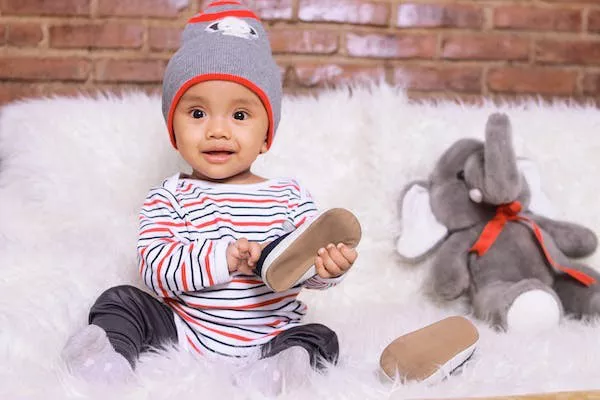The happiness of a newborn baby is a source of immeasurable joy for parents. However, deciphering and understanding the emotions of a baby who cannot express themselves verbally can be challenging. In this comprehensive guide, we will explore the various signs and indicators that can help you determine if your newborn is happy. By recognizing these cues, you can foster a positive environment, enhance your baby’s well-being, and strengthen the bond between you.
-
Smiling and Laughing:
One of the most delightful signs of a happy newborn is their smile. Around the age of six to eight weeks, babies start to develop social smiles, which are directed specifically towards their caregivers. A genuine smile is characterized by an upturned mouth, bright eyes, and sometimes even accompanying laughter. When your baby smiles and giggles in response to your presence or playful interactions, it is a clear indication of their happiness.
-
Eye Contact and Engagement:
Newborns have an incredible ability to establish eye contact, even in their early days. When your baby locks eyes with you and maintains that connection, it is a powerful sign of trust, connection, and contentment. They may respond to your voice, facial expressions, or gestures, displaying their engagement and happiness in your company.
-
Calm and Relaxed Body Language:
Observe your baby’s body language to gain insights into their emotional state. A relaxed and calm body posture, with arms and legs in a comfortable position, indicates contentment. Your baby may appear peaceful, with relaxed facial muscles, open hands, and gently closed eyes. These signs suggest that they feel secure and at ease in their surroundings.
-
Soothing and Calming:
Babies often seek comfort and soothing from their caregivers. If your newborn responds positively to gentle touch, cuddling, or being rocked in your arms, it is a clear sign that they feel safe and loved. The act of soothing and calming your baby helps create a nurturing environment that promotes their happiness and emotional well-being.
-
Alertness and Curiosity:
A happy newborn exhibits curiosity and a sense of engagement with their surroundings. They display alertness by looking around, following objects or faces with their eyes, and responding to sounds. You may notice their eyes widen, eyebrows lift, and body become more animated when they encounter something of interest. This curiosity and engagement indicate their happiness in exploring the world around them.
-
Contentment during Feeding and Sleep:
A well-fed and well-rested baby is generally a happy baby. If your newborn has a healthy appetite, shows enthusiasm during feedings, and is gaining weight appropriately, it suggests that they are content with their feeding routine. Similarly, if they have regular sleep patterns, with adequate naps and restful sleep, it indicates their overall well-being and happiness. A baby who wakes up refreshed and maintains a calm disposition throughout the day is likely to be content and satisfied.
-
Lack of Distress and Unexplained Crying:
While occasional fussiness or crying is normal for babies, a happy newborn is generally calm and settles easily after feedings, diaper changes, or other needs being met. If your baby rarely cries without an apparent reason or displays distress signals, it is a positive indication of their happiness. They may exhibit a general sense of ease and contentment in their day-to-day interactions.
-
Social Interaction and Responsiveness:
Newborns are social beings from the moment they are born. They are responsive to social stimuli and seek interaction with their caregivers. If your baby enjoys being held, responds to your voice or touch, and exhibits a sense of connection during interactions, it is a strong indicator of their happiness. They may display reciprocal gestures, such as reaching out or smiling when you engage with them.
Conclusion:
Understanding the happiness of your newborn is a journey of observation, connection, and responsiveness. By paying attention to their smiles, laughter, eye contact, body language, engagement, and contentment during feeding and sleep, you can gain valuable insights into their emotional well-being. Remember that each baby is unique, and their happiness may manifest differently. By fostering a loving and supportive environment, engaging in positive interactions, and responding to their needs, you can promote your baby’s happiness and lay the foundation for a strong parent-child bond that will endure as they continue to grow.


